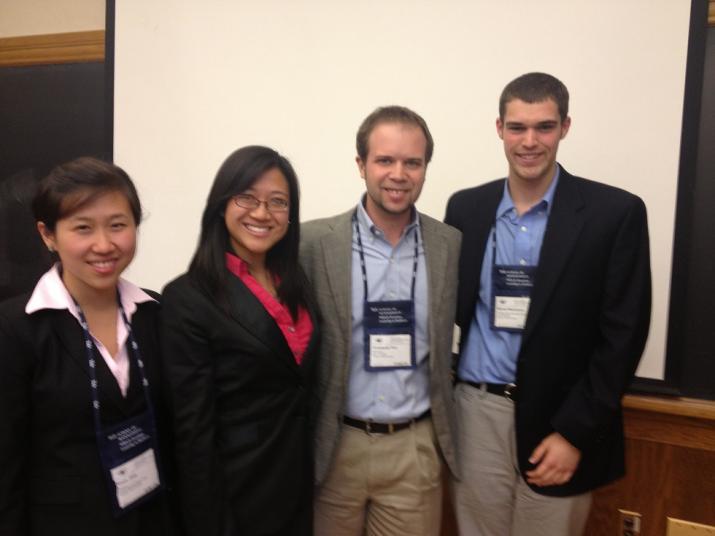
From left: Duke students Grace Zhou, Cecilia Ong, Chris Paul and Michael Maranzano
Published April 16, 2013, last updated on April 9, 2018 under Education News
Seven Duke undergraduates, MSc-GH and doctoral students presented their work at the Unite for Sight Global Health and Innovation Conference last weekend in New Haven, Connecticut. The annual conference attracted more than 2,000 professionals and students from more than 55 countries and is one of the leading conferences focused on global health, international development and social entrepreneurship.
Engineering and global health certificate student Michael Maranzano presented his research on the home delivery of anti-retroviral therapy as a way to improve access to life-saving drugs that can prevent HIV transmission from mother to child. Maranzano has worked with DGHI faculty member Robert Malkin and his laboratory on the Pratt Pouch, a ketchup packet-like pouch containing a single dose of drugs that helps prevent the virus among newborns of HIV-positive moms. The invention was named a top 10 innovative health technology by the World Health Organization last year.
DGHI Doctoral Scholar and Nicholas PhD student Chris Paul presented his work on people’s knowledge and decision-making related to environmental health and fluorosis in the Ethiopian Rift Valley. The region’s groundwater is often contaminated with inorganic elements like fluoride, and consumption of that water is linked with disease. Paul found a lower rate of dental fluorosis among people who were aware of the cause of fluorosis. He suggests education campaigns that encourage behaviors that protect against disease could potentially improve health outcomes.
Global health certificate student and senior Grace Zhou presented her work on the behavioral predictors that influence the psychosocial health of orphans. Linked with the Positive Outcomes for Orphans (POFO) study led at Duke by DGHI faculty member Kathryn Whetten, Zhou’s work calls for an international framework and country-tailored programs that holistically address the individual, social and cultural predictors of psychosocial distress. The multi-country POFO study found that orphans and children who engage in labor outside of the home are particularly vulnerable to psychosocial distress.
Emily Chiscop presented an integrated community-based approach to mental health in Romania; Connor Cotton on incentivizing waste management in low-resource settings; Aaron Forbis Stokes on a low-cost sterilizing toilet to improve decentralized sanitation in developing countries; and Cecilia Ong on implementation of a breast cancer registry in Haiti. Duke Master of Science in Global Health student Xiaochen Dai also presented a poster of his thesis research on malaria diagnoses and trends at rural health facilities in Tanzania.


